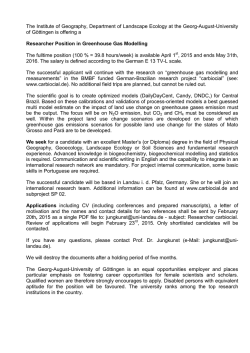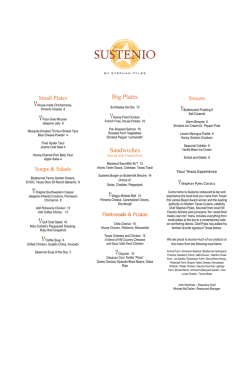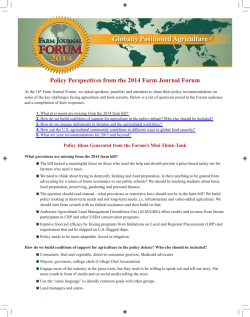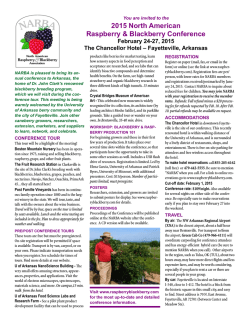
Short Course 2015 - Pacific Agriculture Show
HORTICULTURAL GROWERS’ SHORT COURSE JANUARY 29-31, 2015 Lower Mainland Horticulture Improvement Association together with the Pacific Agriculture Show at TRADEX Abbotsford Airport (Exit 83, Mt. Lehman, south of Hwy #1) Thursday Morning, January 29, 2015 Terralink Room Direct Solutions Room BASF Gallery Raspberries/Strawberries Greenhouse Vegetable Potatoes Chair: Tom Baumann, UFV, Chilliwack, BC Sponsor: Raspberry Industry Development Council Chair: Linda Delli Santi, BCCGA, Surrey, BC Sponsor: BC Greenhouse Growers' Assoc and Flowers Canada Chair: Leisa Yee, BCPVGA, Delta, BC Sponsor: BC Potato & Vegetable Growers Assoc. 9:00-9:30 New Techniques for Getting Raspberries and Strawberries Off to a Better Start Eric Gerbrandt, UFV, Chilliwack, BC Thinking outside of the box to get healthier, better establishment of new fields. 9:30-10:10 Current and Future Options for Soil Fumigation– Panel Discussion Mark Sweeney, BCAGRI, Abbotsford, BC Tom Walters, Walters Ag Research, Anacortes, WA David Mutz, Berry Haven Farms, Abbotsford, BC With the increased regulations, the loss of a local applicator and product registration limitations, is fumigation a practise of the past? 10:10 Refreshment Break 10:25-10:55 Disturbing New Developments on the Raspberry Virus Front Pat Moore, WSU, Puyallup, WA Bob Martin, USDA-ARS, Corvallis, OR Recent research revealed new information about the behavior of Raspberry Bushy Dwarf Virus with some important implications for raspberry growers. 10:55-12:10 Raspberry and Strawberry Variety Developments Chad Finn, USDA-ARS, Corvallis, OR Michael Dossett, BCBC, Agassiz, BC Pat Moore, WSU, Puyallup, WA Eric Gerbrandt, UFV, Chilliwack, BC The future of the berry industry in BC depends on new high yielding, disease-resistant varieties. How is the progress going? Pesticide Re-Certification Credits: 1.25 MEETING ROOM SPONSORS 9:05–9:50 Temporary Foreign Worker Program Matthew Wong, Service Canada, Vancouver, BC The temporary foreign worker program helps employers to meet their needs for low or high-skilled labour. Matt will discuss recent changes to the program that will affect the greenhouse sector. 9:50-10:15 To Fog, or Not to Fog – that is the Question! Mark Stanley, MicroCool, Thousand Palms, CA High-pressure fog systems can be used to humidify and cool greenhouse environments. Mark will discuss the use of fog systems to optimize environmental conditions around the plant to maximize plant growth and crop yield. 10:15 Refreshment Break 10:15-10:55 Strategies for Biocontrol of Aphids in Greenhouse Vegetable Crops Gerben Messelink, Wageningen UR Greenhouse Horticulture, The Netherlands Biological control of aphids is often not successful and considered as too expensive. Gerben will discuss new strategies for aphid control that might increase efficacy and reduce costs. He will discuss the use of generalist predatory bugs, parasitoids, predatory midges, and how to promote the natural infection of aphids by Entomophthora, such as Pandora neoaphidis. 10:55-11:30 Improving Greenhouse Sanitation Anissa Poleatewich, Vineland Research and Innovation Centre, ON The effectiveness of different application methods and several disinfectants for the control of persistent viruses, such as Pepino Mosaic Virus, from greenhouse surfaces. FCC Loft 11:30-12:00 From the Depths of the Earth…to your Greenhouse Alison Thompson, Canadian Geothermal Energy Association, Calgary, AB You may think you've heard it before…but we are not talking geoexhange heat pumps, this is conventional Geothermal Energy. This renewable heat source is available right across the province and is used in 70 countries around the world. Can you harness this heat to lower your production costs? CanGEA tells you how. Agroforestry/Alternate Crops Pesticide Re-Certification Credits: 1.25 • BASF • BMO Bank of Montreal • Direct Solutions • Terralink Horticulture Inc. 9:00–9:20 Growing Forward “2” Improved Control of Wireworm Bob Vernon, AAFC, Agassiz, BC Research is underway across Canada to support new product registrations and alternative methods of control of wireworm in potatoes. 9:20–9:50 Toward a Comprehensive Approach for Wireworm Biocontrol Todd Kabaluk, AAFC, Agassiz, BC Recent advances in biological control offer the possibility to target larvae at planting, as well as adult beetles during rotation years to stem the tide of new infestations and build-up of wireworm. 9:50 Refreshment Break 10:00–10:45 Advances in Pacific Northwest Potato Pest Management Alan Schreiber, Agriculture Dev. Group, Eltopia, WA Growers face significant challenges in managing potato insect pests. Advice on using IPM to improve efficacy of inputs and to reduce risk. 10:45-11:15 Black Dot in Potatoes – Management and Prevention Siva Sabaratnam, BCAGRI, Abbotsford, BC Black dot is caused by a fungus with a wide host range and is present in many potato growing regions of N. America including the Pacific Northwest. Management includes cultural and chemical control options. 11:15-noon 2014 BC Potato Variety Trial Results – With a View From the Kitchen Heather Meberg, ES Cropconsult Ltd., Surrey, BC Trevor Randle, Maple Ridge Secondary School, Maple Ridge, BC New freshmarket potato variety offerings need to be suitable not only from the standpoint of agronomics, but they also need to stand up in the kitchen. Secondary school Chef Instructor Trevor Randle and the Take A Bite of BC program have made culinary assessments a key feature of the BC potato variety trial. Pesticide Re-Certification Credits: 2.0 Chair: Dave Trotter, BCAGRI, Abbotsford, BC Agroforestry in BC focuses on complementing current on-farm management with alternate crops and practices; diversifying cash-flow and labour; providing supplemental income; and, enhancing long-term sustainability. 8:45–9:00 Introduction Dave Trotter, BCAGRI, Abbotsford, BC 9:00–9:30 The W's of Silvopasture – a Production Approach Lisa Zabek, BCAGRI, Kamloops, BC What, Why, Where - initiatives, partnerships and projects which are being developed to support silvopasture as a land use option in BC. 9:30–10:00 Alternate Crops and Agri-tourism – A Year Round Experience Heloise Dixon-Warren and Ted Traer, Moose Meadows Farm, Quesnel, BC See how alternate crops and agri-tourism can provide a unique experience to consumers. 10:00–10:30 Food Forest Agroforestry in Eastern BC Michelle Heinz, Clear Sky Meditation and Study Foundation, Fort Steele, BC Learn about an innovative approach to a food forest model that demonstrates agroforestry practices that are ecologically sound as well as productive in South Eastern BC. 10:30–11:00 Microbreweries – sourcing local suppliers for beer making ingredients Speaker: TBA Find out what specialty crops and products that some BC micro-breweries are looking for to create that locally produced and unique tasting beer. 11:00–11:30 Grass Fed Beef Production and Agroforestry David Zirnhelt, Zirnhelt Ranch, Beaver Valley, BC Learn about an innovative approach to the production and direct marketing of grass-fed beef using a silvopasture management approach. Thursday Afternoon, January 29, 2015 Terralink Room Direct Solutions Room BASF Gallery Raspberries/Strawberries Floriculture Field Vegetables Chair: Mark Sweeney, BCAGRI, Abbotsford, BC Sponsor: Engage Agro Chair: Dave Woodske, BC Ministry of Agriculture Sponsor: Flowers Canada and United Flower Growers 1:30-2:00 Evaluations of New Products for Weed Control in Raspberries and Strawberries Tim Miller, WSU, Mt. Vernon, WA We are getting closer to registration of several new herbicides – the latest performance information. 1:00–1:25 Pot Azaleas, Flanders' Pride - How Breeders, Growers and Researchers Join Efforts to Create a Success Story Stefaan Werbrouck, Ghent University, Belgium During two centuries, azalea breeders used the rhododendron gene pool to create fancy pot plants with double flowers, subtle color variations and extended flowering. In close interaction, researchers and growers refined production practices. Nowadays specialization, automation and flexible marketing allow growers of Flanders azalea to stay competitive. Chair: Noel Roddick, retired agrologist, Delta, BC. Sponsor: Lower Mainland Horticulture Improvement Association 2:00-2:20 Day Neutral Strawberries – Recognizing and Managing Insect Pests Emily Carmichael, ES Cropconsult, Vancouver, BC Day neutral strawberry production systems present some particularly challenging pest issues. 2:20-2:50 How Effective Are Our Fungicides in Controlling Botrytis? Tobin Peever, WSU, Pullman, WA Recent surveys in Washington pointed to concerns with Botrytis resistance to popular fungicides. What is the current situation in BC? What can we do to improve control? 2:50-3:10 SWD Management in Strawberries and Raspberries Tracy Hueppelsheuser, BCAGRI, Abbotsford, BC 2014 was a much better year for raspberry growers in the SWD war. What have we learned so far and how to follow an effective program 3:10-3:30 Opportunities for Improving Raspberry Soil Health Chris Benedict, WSU, Bellingham, WA A long-term study evaluating cover cropping and other management practices on soil and crop performance. 3:30-3:50 Raspberry Market Situation Dianne Klatt, Jennifer Dhaliwal, Pacific Coast Fruit, Abbotsford, BC Finally, raspberry growers received a profitable price for their fruit last year. Will the market stay strong in 2015? Pesticide Re-Certification Credits: 2.0 1:25–2:25 How to Establish Natural Enemies in Ornamental Crops Gerben Messelink, Wageningen UR Greenhouse Horticulture, The Netherlands Dr. Messelink has conducted considerable research on biocontrol systems of greenhouse pests. Factors that impact the establishment of biocontrol agents in a greenhouse are highlighted. 2:25-3:25 Western Flower Thrips: Is The Game Over? Raymond Cloyd, Kansas State University, Manhattan, KS Western flower thrips (WFT) is the most difficult insect pest to deal with in greenhouse production systems. It causes both direct and indirect crop damage via feeding and vectoring viruses, which means the tolerance for this pest is essentially zero. However, the primary means of dealing with WFT involves a holistic approach that combines cultural, physical, chemical, and biological processes. Fundamental management practices need to be implemented to mitigate populations of WFT. 3:25-3:50 What is the Real Story Behind Declining Bee Health? Elizabeth Elle, Simon Fraser University, Burnaby, BC Pollinator declines are in the news and there are multiple causes. Hear the evidence about how pesticides, diseases, and habitat loss affect pollinators and what it means for floriculture. 1:30-2:00 2014 Cole Crop Variety Trials Mike Wallis, Langley, BC Update on broccoli and brussels sprouts variety trials underway in the Fraser Valley. 2:00-2:30 Pest Biology: The Key to an Effective Scouting Program Renee Prasad, ES Cropconsult Ltd., Coquitlam, BC If you ignore the biology of a pest such as carrot rust fly, then scouting and spray programs can go all wrong. How knowledge of pest biology can improve control of challenging insect pests of vegetables. 2:30-3:15 Organic Asparagus Production – Perspectives on this Crop and More from a Washington Vegetable Grower Alan Schreiber, Schreiber & Sons Farm, Eltopia, WA Alan is a vegetable IPM specialist who, in addition to asparagus, grows a range of vegetables for the organic wholesale market and over 100 different crops for the local market. 3:15-3:45 Yellow Nutsedge – A Beast of a Weed Tim Miller, Washington State University, Mt. Vernon, WA Biology and management advice on this invasive weed that is alive and kicking in growing areas of the Pacific Northwest. 3:45-4:00 BC Field Vegetable Production Guide - 2015 Highlights* Susan Smith, BCAGRI, Abbotsford, BC Pesticide Re-Certification Credits: 1.25 3:50-4:10 Ornamentals and Pollinator Protection: Update from Flowers Canada's Activities Cary Gates, Flowers Canada, Guelph, ON An open discussion and update on how ornamental production has been impacted by concerns of pollinator decline and subsequent shifts in production tools, practices and retailer positions. Pesticide Recertification Credit Program LMHIA members holding a Pesticide Applicators Certificate may collect credits towards re-certification as an option to re-writing an exam at the end of the 5 year certificate. Growers may participate in the short course and other pre-approved educational events to collect the required credits (20) over the five year period of their certificate to become re-certiied. Sessions at the Short Course which are eligible for pesticide re-certification credits are indicated with a ladybug logo. To participate in the program a grower must: • Maintain membership in the LMHIA (i.e. register for the short course each year) • Possess a current & valid 5 year certificate in the agriculture general category • Be able to read and comprehend English pesticide labels Opening Reception 4 pm Thursday Everyone Welcome Registration forms for the credit program will be available at the registration desk during the Growers’ Short Course. Cover photo credit: Collect Pesticide Credits!! Watch for the sessions with a ladybug logo. The total credits for eligible sessions are indicated at the bottom of each session. Dave Woodske, Industry Specialist Ornaments & Greenhouse Vegetables BCAGRI, Abbotsford Friday Morning, January 30, 2015 Terralink Room Direct Solutions Room BASF Gallery Building Farm Business Success Nursery Farm Direct Marketing Chair: Don Low, BCAGRI Creston, BC Sponsor: BCAGRI Business Knowledge & Strategic Adaptation Program - Forward 2 Initiative and Farm Credit Canada Chair: Dave Woodske, BCAGRI, Abbotsford, BC Chairperson: Donna Anaka, BCAGRI, Vancouver, BC 9:00–9:10 Nostoc: A New Nursery Pest Dave Woodske, BCAGRI, Abbotsford, BC Nostoc, a blue-green algae is showing up in nursery container beds in North America. It colonizes gravel & other surfaces, making them very slippery & hazardous to workers. 9:00-9:15 Welcoming Remarks Murray Siemens, Fraser Valley Farm Direct Marketing Association, Abbotsford, BC 9:00-9:45 Cherry Exports to Asia, a Model for Other Agriproducts? Andre Bailey, President, Global Fruit Ltd., Creston BC Andre is the President of the Global Fruit Ltd., the largest private cherry marketer in Canada. BC Cherries are the first fresh fruit to gain access to the Chinese market and others will follow. Learn about the challenges and opportunities with this exciting new market. 9:45-10:30 Canada's Trade Agenda – Opportunities for 2015 and Beyond Denis Landreville, AAFC, Ottawa, ON Denis is Agriculture and Agri-Food Canada's lead negotiator for regional agreements and is currently working on the Trans-Pacific Partnership. His presentation will provide an update on the status of this agreement and discuss the implications for the BC agriculture industry. 10:30 Refreshment Break 10:45-12:00 Trends and Opportunities in International Food Markets David Hughes, Emeritus Professor, Imperial College, London, UK David speaks at international agriculture conferences and seminars with great understanding and vision concerning world food markets. He draw from his extensive experience in the international agri-food sector to discuss how global food markets impact you and your business. David Hughes, Keynote 9:10–9:30 Vineland's Hardy Rose Breeding Program Anissa Poleatewich, Vineland Research and Innovation Centre, ON Hear the findings of research efforts to determine predominant races of the black spot pathogen in Canada and to screen breeding material for disease resistance. 9:30-10:00 PlantPoint: Smarter Irrigation Through Science Chris Lund, Decagon Devices, Pullman, WA Decagon's efforts to commercialize the wireless moisture sensor network for containerized crops was introduced at last year's show by Dr. Marc van Iersel. PlantPoint is a user-friendly integrated hardware and software package that offers scalable, wireless and cost-effective irrigation management. 10:00 Refreshment Break 10:00 Refreshment Break 11:00–11:30 Sustainable Sourcing: What Does This Mean for BC Agrifoods Producers? Jaclyn Laic, ARDCORP, Abbotsford, BC The scoop on how Environmental Farm Practices, OnFarm Food Safety and Traceability can help you sell more to major food retailers. 10:00-10:30 What Is All The "Buzz:" Systemic Insecticides and Pollinators Raymond Cloyd, Kansas State University, Manhattan, KS The characteristics, benefits and limitations of systemic insecticides used in nursery production. The impact of systemic insecticides and the issues associated with their effects on pollinators will be addressed. 10:30-11:15 Drip Irrigation of Nursery Crops Inge Bisconer, Toro Micro-Irrigation, El Cajon, CA There are many advantages to drip irrigation, including improved crop quality and uniformity, better resource use efficiency and enhanced stewardship. The use of drip irrigation, including drip tape and dripline products, efficiently irrigates field-grown and containerized nursery stock. 11:15-12:00 Optimizing Your Soilless Media Lance Lawson, Premier Tech Horticulture, Utah Recommended physical and chemical properties of a soilless growing media and the benefits of incorporating microbial additives, such as biofungicides and mycorrhizae products, in the media. David Hughes is Emeritus Professor of Food Marketing at Imperial College London. He travels the world talking to businesses, trade associations, governments and conferences on global developments in the food and drink industry. A highly sought-after speaker wherever he goes, he has an unparalleled knowledge of global food issues and opportunities. 9:15-10:00 Pricing, Distribution and Profitability Andrea Gray-Grant, Gray-Grant Consulting Inc., Vancouver, BC Consumer demand for local continues to be "hot". You can maximize your business success by carefully considering your product price, path to market and potential for profit. Learn how to break down product cost, maintain appropriate margins and understand the costs associated with the distribution of your product to retail. 10:15-11:00 Really, what is a Farmers' Market? Jon Bell, B.C. Assoc. of Farmers' Markets, Sechelt, BC A look at today's farmers' markets in BC, the differences in marketing and sales, public versus private, along with a discussion on the complex issues facing over 125 markets in rural and urban settings. 11:30-12:00 Major Food Retailer's Purchasing Criteria Ken Clark, Overwaitea Food Group, Langley, BC Discover what is needed to get your products listed in a major supermarket. BMO Room Agri-energy & Waste Management Forum 9:30–11:00 Anaerobic Digestion Session 1: Seabreeze Farm Building an anaerobic digester involves many different technologies and local contractors. Through rapid-fire presentations, learn about some of the technologies and contractors that have contributed to Seabreeze Farm's anaerobic digester in Delta. These presentations will provide useful background information for the Seabreeze Farm site visit on January 31st. 11:10–12:20 Anaerobic Digestion Session 2: Technology Updates Anaerobic digestion technology adoption and technological advancements are ongoing. Learn about adoption and exciting advancements in anaerobic digestion technology, both locally and internationally. Friday Afternoon, January 30, 2015 Terralink Room Direct Solutions Room BASF Gallery All Berries Nursery Field Vegetables Chair: Mark Sweeney, BCAGRI, Abbotsford, BC Sponsors: Farm Credit Canada and Engage Agro Chair: Dave Woodske, BCAGRI, Abbotsford, BC Chair: Mike Boot, Engage Agro, Chilliwack, BC 1:00-4:00 Taking Your Lean Program to the Next Level Dale Schattenkirk, LTS Consulting, Regina, SK This hands-on session, led by Dale Schattenkirk and two presenters from the region, will demonstrate how to apply Lean tools in your specific environment. After a quick review of some tools, you'll learn about practical applications for the Lean method that get dramatic, measurable results. Two tools that will be highlighted are 5S and Kanban. 1:00-2:00 Vegetable Varieties for the 2015 Season Brian Campbell, Westcoast Seeds, Delta, BC Leah Erickson Stoke Seeds, Delta, BC Brian Logan, Logan-Zenner Seeds, WA Ben Yurkiw, Agrium AT, Abbotsford, BC 1:30-1:50 Blueberry SWD Experience in 2014 Tracy Hueppelsheuser, BCAGRI, Abbotsford, BC 2014 was a much better year for blueberry growers, but still held some significant challenges late in the season. 1:50-2:10 What Has Six Years of Living with SWD Taught Us Tom Peerbolt, Peerbolt Crop Management, Portland, OR How to incorporate our current SWD knowledge into an effective management program 2:10-2:35 The Challenges of Controlling Pests in Organic Blueberries Alan Schreiber, WA Blueberry Commission, Eltopia, WA There is market potential for organic blueberries, but can we control SWD and mummy berry in a coastal climate? 2:35-2:55 Yellow Nutsedge – An Increasing Weed Threat to Berry Crops Victoria Brookes, PARC, Agassiz, BC This weed has been ranked as one of the world's most difficult weeds. How to recognize and contain its spread. 2:55-3:05 Food Safety – Critical New Information for 2015 Elsie Friesen, BCAGRI, Abbotsford, BC More national and international regulatory changes are on the horizon – if you are not on a food safety program, you may not find a home for your fruit. 3:05-3:25 Evaluating New Pesticides for Insect Control in Blueberries and Raspberries Carolyn Teasdale, ES Cropconsult, Vancouver, BC Learn about performance of new potential products for aphid and weevil control 3:25-3:45 Pesticide Access – New Products and Challenges for 2015 Mark Sweeney, BCAGRI, Abbotsford, BC The good, the bad and the ugly in the world of berry crop protection tools. Pesticide Re-Certification Credits: 2.0 5S is a powerful solution to a problem, and so the first step in using it is: identifying the problem you're trying to solve. Participants will learn how to collect and document simple, practical measures that ensure your 5S activity solves the root problem, and has a positive impact on your business. Dale will cover the activities from pre-work to sustaining stages, and give each participant the opportunity to start to plan their own improvement area. Kanban is an inventory management system that allows organizations to ensure they have the needed stock, when they need it. The system ensures the right level of inventory. There are many different types of Kanban inventory systems, from stock cards to bins. Dale will explore the different options, how to set each one up, and teach participants how to calculate minimum and maximum inventory levels. Two presenters from the region will discuss their experience implementing 5S and Kanban projects. They will provide visuals of how the systems worked for them and the lessons they learned on how to sustain them. Dale will conclude by discussing how organizations transform themselves by using the complete Lean methodology. He'll discuss additional examples in agriculture and focus on how you can sustain change in your organization's improvement journey. 2:40-3:00 Keeping Food Safe to Eat – From the Producer to the Consumer Alison Speirs, BCAGRI, Abbotsford, BC There are risks to food safety for ready-to-eat produce from production all the way to the consumer. It is essential for producers to take a critical look at their onfarm management and to be aware of food safety risks to produce after it leaves the farm. 3:00-3:30 Weed Management Strategies Using Cover Crops Mitch Hunter, Penn State U., State College, PA Hear results from research of winter cover crops in Pennsylvania and learn more about how diverse cover crop mixtures can contribute to ecological weed management in annual cropping systems. 3:30-4:00 Managing the Herbicide Mix Grant McMillan, ICMS, Abbotsford, BC Timely reminders on the importance of herbicide groups, modes of action, timing, water volume, systemic vs contact, organic herbicide options and more to make good weed control decisions and avoid tankmix pitfalls. Pesticide Re-Certification Credits: 1.0 4:00 LMHIA Business Meet Terralink Room Everyone Welcome! BMO Room Agri-energy & Waste Management Forum Renewable energy and waste management technologies take advantage of underutilised resources, diversify income, manage waste and reduce costs. Key to the success of any renewable energy or waste management project is selecting the appropriate technology to meet your specific on-site energy and/or waste opportunities and challenges. The 2015 Agri-energy & Waste Management Forum will enable you to increase your understanding of renewable energy and waste management technologies relevant to you. 2:00-2:40 Taking a Good Look at Irrigation Water is a Good Idea Pascal Delaquis, AAFC, Summerland, BC Justin Falardeau, University of BC, Vancouver, BC Irrigation water is a risk factor in the transmission of verotoxigenic E. coli to growing vegetables. Efforts to determine seasonal prevalence and characteristics of pathogenic E. coli in surface waters and on fresh produce can aid producers in food safety management. 1:10–1:50 The Environmental Farm Plan Every step in the agriculture process can affect the environment. The Environmental Farm Plan (EFP) program, delivered by ARDCorp and funded by Growing Forward 2, a federal-provincial-territorial initiative, is a confidential guided process to help farmers identify onfarm environmental strengths and weaknesses. Attend this session to learn why 4,000 BC farmers have adopted the EFP and to find out how you can get a customized plan for your farm at no-charge. 2:00–3:10 Nutrient and Waste Management Opportunities With coming changes to the agricultural waste control regulations in BC, the need for appropriate nutrient and waste management technologies is increasing. Learn about some of these technologies and how they might impact agriculture in BC. 3:20–4:20 Pyrolysis Opportunities and Challenges Pyrolysis is fast emerging as a potential technology to convert woody materials into biochar, a highly porous charcoal material with a high surface area. Hear how research in BC is trying to determine the potential for using pyrolysis within BC’s agriculture sector. Saturday Morning, January 31, 2015 Terralink Room FCC Loft BASF Gallery Blueberries Hazelnuts Chair: Peter Andres, BCHGA, Agassiz, BC Organic Chair: Rhonda Driediger, Driediger Farms, Langley, BC Sponsors: Driediger Farms Ltd. & Berryhill Foods Inc. 9:00-9:20 Phomopsis in Blueberries-Another Victory for Science Siva Sabaratnam, BCAGRI, Abbotsford, BC This disease has recently caused serious losses in young blueberry planting, but new findings will help growers keep it in check. 9:20-9:50 Tissue Testing to Assess Plant Nutrient Status in Blueberry Varieties - What Have We learned? Bernadine Strik, OSU, Corvallis, OR Recent research has shown some interesting differences between blueberry varieties which could have implications for fertilizer management. 9:50-10:10 What Causes Green Fruit Drop and Can We Prevent It? Eric Gerbrandt, UFV, Abbotsford, BC The variety, Draper, is prone to dropping green fruit just prior to ripening. 2014 trials showed promise in solving this disorder. 10:10 Refreshment Break 10:25-10:55 From Planting to Maturity – Which Cultivars Rise to the Top From a Production Perspective? Bernadine Strik, OSU, Corvallis, OR New research and field information on variety performance 10:55-11:15 Towards Better BC Adapted Blueberry Varieties Michael Dossett, BCBC, Agassiz, BC The BC program is in its infancy, but progress in being made on many fronts. Quality, yield and disease resistance is being introduced into new potential varieties. 11:15-12:00 What is Happening in the Wide World of Berries David Hughes, Emeritus Professor, Imperial College, London, England David speaks at international agriculture conferences and seminars with great understanding and vision concerning world food markets. Learn about the many issues driving global trends in berries and the impacts they will surely have on your business. Pesticide Re-Certification Credits: 0.25 9:00-9:10 Future of the Hazelnut Industry in BC Peter Andres, BCHGA, Agassiz, BC 9:10-9:55 Facing Challenges of Replanting New Varieties-Part 1 Larry George, George Packing Company, Newberg, OR A testimony of grower experience in Oregon - facing the challenges of replanting new varieties Chair: Gary Jones, Kwantlen Polytechnic U., Langley, BC Sponsor: Fraser Valley Organic Producers Assoc. 9:00–9:30 Standards Maintenance - In Pursuit of Better Clarity Susan Smith, BCAGRI, Abbotsford, BC The Canada Organic Standard and Permitted Substances List are being revised. Hear about the process and highlights of proposed amendments. 9:55-10:30 Latest BC Trial Information on New Hazelnut Varieties Thom O'Dell and Haley Argen, Nature Tech Nursery, Langley, BC. Learn about the preliminary information that has been gained from field trials with EFB resistant varieties. 9:30-10:00 Managing for Maggots and Miners Renee Prasad, ES Cropconsult Ltd., Coquitlam, BC Fly pests of vegetables including carrot rust fly, cabbage root maggot and leafminer cause damage in the larval stage. Recommendations on physical controls and management to combat these challenging pests. 10:30 Refreshment Break 10:00 Refreshment Break 10:45-11:30 Facing Challenges of Replanting New Varieties-Part 2 Larry George, George Packing Company, Newberg, OR Further information on new varieties with emphasis on the market requirements of Oregon receiving stations 11:30-12:00 Report on a Hazelnut Enterprise Budget for BC Ermias Afeworki, KPU, Richmond, BC A look at estimated costs and returns for establishing a Hazelnut Orchard Refreshment Break Sponsors • BC Blueberry Council • ES Cropconsult Ltd. • Berryhill Foods Inc. • Country Life in BC • Penergetic Canada 10:10-10:40 Keeping the Door Shut on Invasive Vegetable Pests Tracy Hueppelsheuser, BCAGRI, Abbotsford, BC Brown marmorated stink bug and Swede midge are pests of vegetables that are on the move in other parts of N. America. Awareness and prevention are key to preventing problems in BC crops. 10:40-11:10 Environmental Farm Planning-A Tool to Manage Nutrients David Poon, BCAGRI, Abbotsford, BC Using principles of crop utilization & soil interactions of key crop nutrients, the Environmental Farm Planning program can aid in nutrient management for field vegetable crops. 11:10-12:00 Cover Crops to Achieve Multiple Farm Goals James LaChance, Penn State U., State College, PA Mitch Hunter, Penn State U., State College, PA Winter cover crop research from several Pennsylvania farms and Penn State Rock Springs Research Farm. Issues include cover crop timing, termination, and general management to aid in farmer insight and adoption of cover crop mixes. Using cover crop “cocktails” or mixtures to achieve multiple goals on the farm, including weed suppression, nitrogen retention, and nitrogen provisioning. Direct Solutions Room Agri-energy & Waste Management Forum 9:30–11:30 Legality of Agri-energy and Waste Management in BC (hosted by MillerThomson) Regulations play a large part of any renewable energy or waste management project. Gain insight into relevant BC renewable energy or waste management policies, and learn specifics about BC's Agricultural Waste Control Regulation, air quality and odour management programs. SITE VISIT Noon–4:30 Seabreeze Farm Anaerobic Digester Site Visit (sponsored by Ch-Four Biogas) See BC's newest anaerobic digester. Seabreeze Farm's anaerobic digester converts 24,000 tonnes of manure and off-farm organics each year into over 2 million cubic meters of pipeline quality natural gas. See this technology firsthand to learn how it can be used to positively impact farming in BC. The Seabreeze Farm site visit will include a BBQ lunch, coffee and tea. Saturday Afternoon, January 31, 2015 Terralink Room Direct Solutions Room BASF Gallery Blueberries Hazelnuts Organic Chair: Mark Sweeney, BCAGRI, Abbotsford, BC Sponsors: BC Blueberry Council & Berryhill Foods Inc. Chair: Peter Andres, BCHGA, Agassiz, BC Chair: Harvie Snow, FVOPA, Delta, BC Sponsor: Fraser Valley Organic Producers Assoc 1:30-2:15 The Blueberry Market in 2015 – Implications for BC Growers – Panel Jesse Brar, Golden Eagle Farms, Pitt Meadows, BC Jason Smith, Fraser Berry Farms, Abbotsford, BC Havey Krause, South Alder Farms, Abbotsford, BC The BC and global crop broke another record in 2014 with more fruit to come in 2015. What do BC growers and packers need to do to survive and thrive in this breaking blue wave. 2:15-2:45 How Effective are our Fungicides in Controlling Botrytis? Tobin Peever, WSU, Pullman, WA Recent surveys in Washington pointed to concerns with Botrytis resistance to popular fungicides. What is the current situation in BC? 2:45-3:05 Evaluating Techniques for Better Blueberry Pollination* Elizabeth Elle, SFU, Burnaby, BC Pollination and fruit set continues to be one of the major limiting factors in blueberry production. Research is underway to assess ways to achieve better set. 3:05-3:25 Weevil Management in Blueberries Tracy Hueppelheusser, BCAGRI, Abbotsford, BC Weevils continue to decimate many BC blueberry fields. Learn to recognize the signs and nip them in the bud. 3:25-3:45 Lessons Learned from a Seven Year Nitrogen Fertilization Experiment Tom Forge, PARC, Summerland, BC Key findings from the long-term blueberry trials at the Agassiz Research Station Pesticide Re-Certification Credits: 1.0 1:15-2:30 BC Hazelnut Industry Growth and Revitalization Initiative Darrell Toma, Toma & Bouma CMC, Edmonton, AB What does the hazelnut industry in BC need to do to thrive and prosper? An interactive session with input from existing and potential growers. 2:30- 3:00 Business Meeting (AGM) of the BC Hazelnut Growers Association Everybody, members and non-members, welcome to attend-reports, financial statement,and election of officers 3:00-3:15 Wrap-up Session and Closing Peter Andres, BCHGA president, Agassiz, BC Education Session Sponsors • BC Blueberry Council • BC Potato & Vegetable Growers Association • BC Greenhouse Growers Association • Berryhill Foods Inc. • Driediger Farms Ltd. • Engage Agro • Farm Credit Canada • Flowers Canada • Fraser Valley Organic Producers Association • Growing Forward 2, a Federal-Provincial-Territorial Initiative • Raspberry Industry Development Council • United Flower Growers 1:30-2:00 Keeping Food Safe to Eat – From the Producer to the Consumer Alison Speirs, BCAGRI, Abbotsford, BC There are risks to food safety for ready-to-eat produce from production all the way to the consumer. It is essential for producers to take a critical look at their onfarm management and to be aware of food safety risks to produce after it leaves the farm. 2:00-2:30 Nitrate Accumulation in Vegetables – Something to Avoid Mike Bomford, Kwantlen Polytechnic University, Richmond, BC Nitrate is a nutrient for growing vegetables but not for the consumer. Research shows links between warm temperatures, low light growing conditions and nitrate accumulation in produce; recommendations for management. 2:30-3:00 Dung Beetles – Nature's Pooper-Scoopers Matt Jones, Washington State University, Pullman, WA Dung beetles play an important ecological role in removing feces above ground and in killing pathogens in the feces that they feed on. Entomologists at WSU are investigating what the potential is for dung beetles to suppress harmful foodborne pathogens in the soil before they spread to humans. 3:00-3:45 Post-Harvest Handling of the Vegetable Mix -Tips to Success – Grower Panel Facilitator: Susan Smith, BCAGRI, Abbotsford, BC Lydia Ryall, Cropthorne, Delta, BC Andrew Arkenstyn-Vogler, Crisp Organics, Abbotsford Harvie Snow, Snow Farms, Delta, BC Bruce Wisbey, Wisbey Veggies, Yarrow, BC Registration Information: Register ON-LINE at www.agricultureshow.net or download the PDF registration form online Registration fees: $79.00 (by January 12) or $110.00 (after January 12) 2014/2015 LMHIA Board of Directors President: James Bergen Vice-President: Jordan Krause Secretary: Susan Smith Treasurer: Mark Sweeney Andrew Arkestyn-Vogler Mike Boot Trevor Harris Jeff Husband Brian Johnston Alf Krause Sid Kwantes Ed McKim Grant McMillan Heather Meberg David Mutz Lydia Ryall Kerry Seale Harvie Snow Ria van Eekelen Bruce Wisbey Your Course Registration Fee includes: • Annual Membership in the LMHIA • Attendance in any or all educational sessions • Admittance to the Pacific Agriculture Show • Admittance to Thursday afternoon welcome reception • Participation in the Pesticide Applicators License Re-certification Program For further information Phone: 604-556-3001 or 604-857-0318 or www.agricultureshow.net Ex Officio Directors Donna Anaka Jennifer Curtis Michael Dossett Sheila Fitzpatrick Elsie Friesen Shawn Halter Gary Jones Todd Kabaluk Dave Trotter Bob Vernon Dave Woodske Executive Director Sandy Dunn Platinum Sponsors The Horticulture Growers’ Short Course is produced jointly by the British Columbia Ministry of Agriculture and the Lower Mainland Horticulture Improvement Association in partnership with the Pacific Agriculture Show
© Copyright 2026







